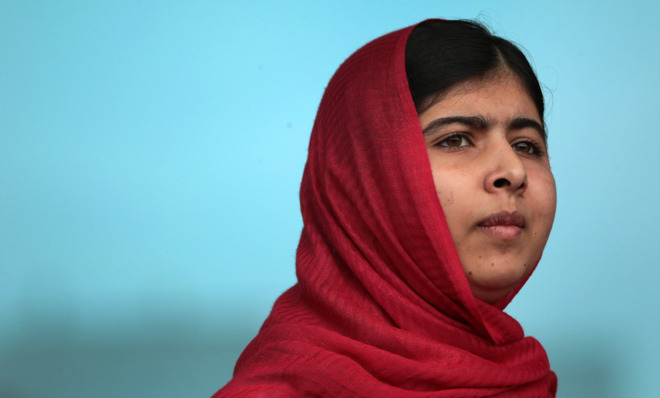Why Malala Yousafzai should have won the Nobel Peace Prize
Short-sighted politics prevails once again

A free daily email with the biggest news stories of the day – and the best features from TheWeek.com
You are now subscribed
Your newsletter sign-up was successful
This morning, the Nobel Peace Prize was awarded to the Organization for the Prohibition of Chemical Weapons (OPCW), the global watchdog group faced with the daunting task of eliminating chemical weapons in Syria.
The move struck some as premature — especially considering there is no guarantee the group will even be successful in Syria, a country that is still in the middle of a bloody civil war that has killed more than 100,000 people.
This isn't the first time the Nobel Peace Prize has been criticized. Last year, eyebrows were raised when it was awarded to the European Union.
The Week
Escape your echo chamber. Get the facts behind the news, plus analysis from multiple perspectives.

Sign up for The Week's Free Newsletters
From our morning news briefing to a weekly Good News Newsletter, get the best of The Week delivered directly to your inbox.
From our morning news briefing to a weekly Good News Newsletter, get the best of The Week delivered directly to your inbox.
In 2009, President Barack Obama was given the prize for "his extraordinary efforts to strengthen international diplomacy and cooperation between peoples," despite the fact that he had only been elected a year earlier. Obama hasn't exactly been a dove since then, threatening to launch military strikes, awkwardly enough, against Syria.
Indeed, the Nobel bears all the hallmarks of a political statement — strikes bad, chemical weapons destruction good — rather than an earnest effort to seek the person or persons who most advanced the cause for peace in the past year. After all, OPCW wouldn't even be in Syria were it not for concessions from Syrian President Bashar al-Assad and Russian President Vladimir Putin. Where are their prizes?
This year, most people seemed to be rooting for Malala Yousafzai, the 16-year-old who became an activist for women's education after being shot in the head by the Taliban.
Sure, it's hard to argue that the OPCW's mission isn't a worthy one, but its win reinforces the idea that the Nobel Peace Prize is not purely about recognizing brave individuals like Yousafzai.
A free daily email with the biggest news stories of the day – and the best features from TheWeek.com
"To understand the Nobel Peace Prize, one has to grasp that it’s not actually a prize for doing good," writes Indian journalist Praveen Swam. "It is, instead, a medium to propagate what might broadly be called the North Atlantic moral aesthetic of politics."
Overall, the decision to deny Yousafzai makes it hard to take the Nobel Peace Prize seriously, writes James S. Robbins in USA Today:
These prizes were ill-deserved, hurt the legitimacy of the Nobel brand and raised serious questions about the laureate selection process. Giving awards to the people on the ground – honoring the workhorses instead of the show horses — will help rebuild the authority of the Nobel Prize as a meaningful force for peace. [USA Today]
Ultimately, Yousafzai's organization reacted with the grace one would assume from a Nobel Peace Prize nominee:
Keith Wagstaff is a staff writer at TheWeek.com covering politics and current events. He has previously written for such publications as TIME, Details, VICE, and the Village Voice.
-
 ‘The West needs people’
‘The West needs people’Instant Opinion Opinion, comment and editorials of the day
-
 Filing statuses: What they are and how to choose one for your taxes
Filing statuses: What they are and how to choose one for your taxesThe Explainer Your status will determine how much you pay, plus the tax credits and deductions you can claim
-
 Nan Goldin: The Ballad of Sexual Dependency – an ‘engrossing’ exhibition
Nan Goldin: The Ballad of Sexual Dependency – an ‘engrossing’ exhibitionThe Week Recommends All 126 images from the American photographer’s ‘influential’ photobook have come to the UK for the first time
-
 The billionaires’ wealth tax: a catastrophe for California?
The billionaires’ wealth tax: a catastrophe for California?Talking Point Peter Thiel and Larry Page preparing to change state residency
-
 Bari Weiss’ ‘60 Minutes’ scandal is about more than one report
Bari Weiss’ ‘60 Minutes’ scandal is about more than one reportIN THE SPOTLIGHT By blocking an approved segment on a controversial prison holding US deportees in El Salvador, the editor-in-chief of CBS News has become the main story
-
 Has Zohran Mamdani shown the Democrats how to win again?
Has Zohran Mamdani shown the Democrats how to win again?Today’s Big Question New York City mayoral election touted as victory for left-wing populists but moderate centrist wins elsewhere present more complex path for Democratic Party
-
 Millions turn out for anti-Trump ‘No Kings’ rallies
Millions turn out for anti-Trump ‘No Kings’ ralliesSpeed Read An estimated 7 million people participated, 2 million more than at the first ‘No Kings’ protest in June
-
 Ghislaine Maxwell: angling for a Trump pardon
Ghislaine Maxwell: angling for a Trump pardonTalking Point Convicted sex trafficker's testimony could shed new light on president's links to Jeffrey Epstein
-
 The last words and final moments of 40 presidents
The last words and final moments of 40 presidentsThe Explainer Some are eloquent quotes worthy of the holders of the highest office in the nation, and others... aren't
-
 The JFK files: the truth at last?
The JFK files: the truth at last?In The Spotlight More than 64,000 previously classified documents relating the 1963 assassination of John F. Kennedy have been released by the Trump administration
-
 'Seriously, not literally': how should the world take Donald Trump?
'Seriously, not literally': how should the world take Donald Trump?Today's big question White House rhetoric and reality look likely to become increasingly blurred